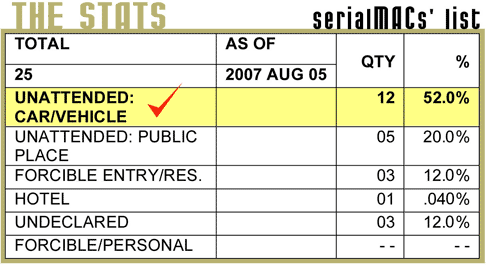
Receiving some guests recently, particularly the parents of an American volunteer in town for his wedding, and his counterpart from the Ifugao province, we touched upon the issue of keeping our things safe from thieves even in a seemingly safe place like mid-scale Ortigas and its upscale cafés.
Our volunteer-friend narrated how he once dropped his cell phone in a tricycle in Kiangan, Ifugao, only to be returned to him after it was found by young locals who called the last number they saw was dialed. Apparently, the youth who found his cell phone called up our friend's last dialed number and told the answering party that they were looking for the owner of the cell phone. Our friend was informed about it a few days later and was just too happy to take the 30-minute rough ride down to Kiangan to retrieve his cell and treated the finders to a round of drinks. Our friend knows that if that happened in a highly urbanized area besides Metro Manila, that retrieval was highly improbable.
I came upon this New York Times article and recalled the discussion we had at the Ortigas café. It is about the Japanese Law on Lost Goods or the ''Notes on the Law on Lost Property'', a code established in 718 (that's right, before the unification of Japan). It states, in part:
Back then, lost goods, animals and, mysteriously, servants had to be handed over to a government official within five days of being found. After a year, the government took over the belongings, though the owner could still reclaim them. The code stipulated that people had no right to keep lumber found adrift in a flood.
Shoujiki, or "honesty" in Japanese, pertains to the ideals of being truthful and sincere. It is one of many ways "honesty" in Japanese is carried out or lived by. It does not even have to be a biblical tenet, just a basic human principle of trust and respect and fairness, even in today's world of the disposable and instant.
In modern Japan, what used to be the loss and retrieval of livestock, vegetables and lumber have given way to gadgets, toys and other personal ephemera.
The item with the highest return rate -- 75 percent -- is the cellphone, which has flooded the center in the last three years. Owners typically call their own phones, or the center traces the owners through their subscription and sends a notification postcard.
We've often wondered how else besides being precise, pragmatic and respectful, the Japanese are successful at whatever undertaking they attempt or do. I would surmise that adhering to and respecting tradition and their own version of the concept of kapwa-tao (sharing and kindness), albeit basic as it sounds, are ingredients to keeping their public safe and their integrity intact.
''I feel uncomfortable holding another person's money,'' Mr. Hirahaya (a photographer who found and returned cash) said ''I think many Japanese people feel the same way and hand over something they find. I think among Japanese there's still a sense of community since ancient times.
Read the full New York Times article Never Lost, but Found Daily: Japanese Honesty by Norimiysu Onishi (Published: January 8, 2004) and see what lessons we can get from practicing something as simple and basic as honesty.
‣ Calligraphy image courtesy of www.orientaloutpost.com ‣ Lost and found center image courtesy of the New York Times.
Here's the LIST of stolen items (updated).







No comments:
Post a Comment